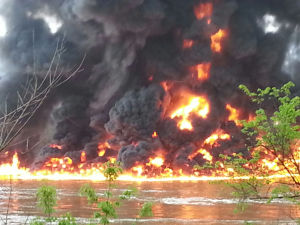The derailment of 14 oil-laden CSX tank cars and subsequent huge fire caused by three of them Wednesday in downtown Lynchburg underscores a number of environmental threats brought on by America’s fast-changing energy markets.
Three tank cars carrying crude oil from North Dakota Bakken Field that involves hydraulic fracking drilling methods shot flames hundreds of feet into the air and spilled 50,000 gallons of fuel into the James River, from which Richmond, about 120 miles away, gets its drinking water. City officials say they are monitoring the cleanliness of water.
The Bakken crude was on its way for a former Amoco oil refinery at Yorktown on Chesapeake Bay. If bans on exporting U.S. crude are lifted, Yorktown could become a major crude oil shipping point because the facility, now owned by Plains All American, already has the piers and pipes in place to handle large scale shipments of oil. They may end up in Europe to replace fuel jeopardized by the Russian-Ukrainian conflict.
All of this points out just how fast changing the energy dynamics are in the U.S. and how ill-equipped American infrastructure, a victim of conservative spending policies, is to handle it.
America’s railroads and pipelines are too stressed or inadequate to handle the sudden flow of oil and gas that fracking has produced. Pipelines and tank terminals have been filled to capacity, making oil shippers more reliant upon railroads which seem to have chronic problems keeping their lines and gear in shape.
The worst case so far happened when a train laden with North Dakota oil became a runaway while stopped in Lac-Megantic, Quebec last year and the resulting explosion and fire killed 47 people. Oil trains routinely pass through major metropolitan areas including Baltimore, Washington and Richmond.
What’s more coal-related problems have been threatening drinking water in the Upper South, Mid-Atlantic region. In January, the leak of a toxic chemical near the Kanawha River in Charleston meant that some 300,000 people had to go without drinking water for a week. Later, coal ash owned by Duke Energy leaked into the Dan River, threatening the drinking water supplies of Danville. Now, Richmond is on watch about its supplies.
What’s infuriating about all of this is that you hear a lot on this blogs of about tight spending and how little Net-based controls will make our lives infinitely better. Well, we now see what short-changing public works spending does and how it threatens lives. As for all those little Net things, well, where are they? Where were they in Lynchburg or Lac-Megantic?



